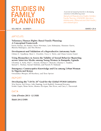Emergency Contraceptive Knowledge and Use among Urban Women in Nigeria and Kenya
Abstract
Rates of emergency contraceptive (EC) use in sub-Saharan Africa are highest in Kenya and Nigeria, although little is known about user characteristics and use dynamics in these countries. To better meet women's emergency contraceptive needs and to contribute to the limited knowledge base regarding this method in Africa, this study examines data from a sample of EC users drawn from a large, representative household survey that included sexually experienced women in urban Kenya and Nigeria. Bivariate and multivariate analyses reveal greater knowledge of EC among these urban women than was reported in other nationally representative surveys. Recent users of EC were more likely to be in their 20s, unmarried, and more highly educated than never users or ever users of EC in both countries. Results contradict public perceptions of EC users as young adolescents and indicate the importance of strengthening EC provision in Africa, including targeting information and services to unmarried women and supporting private pharmacies in delivering quality services.




